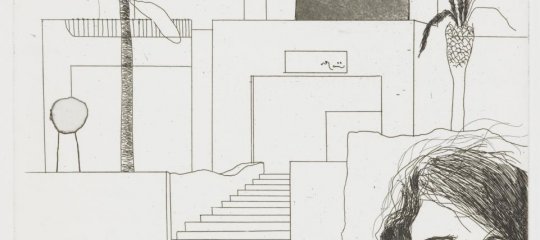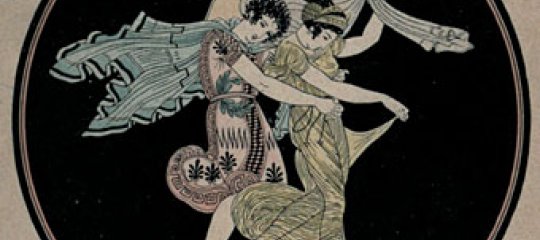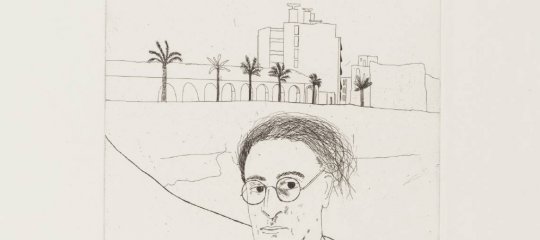Πάμε μια βόλτα στο ..
errante writes, "Φίλοι και συνάδελφοι, όσοι από σας θα βρίσκεστε ακόμη στην Ελλάδα στις αρχές του Σεπτέμβρη και ενδιαφέρεστε, ελάτε να πάμε μια βολτούλα στο Κιάτο, υπάρχει λόγος σοβαρός!!
"
16 Αυγούστου 2005
Στις 3 και 4 Σεπτεμβρίου 2005 το θέατρο ΑΤΤΙΣ οργανώνει μια ενδιαφέρουσα εκδήλωση στην αρχαία Σικυώνα και στο Κιάτο, που περιλαμβάνει: παράσταση του Αίαντα, εργαστήριο και συμπόσιο.
3 Σεπτεμβρίου, Σάββατο: «ΑΙΑΣ», αρχαία Σικυών, στο αρχαίο θέατρο
4 Σεπτεμβρίου, Κυριακή: Αποθήκες ΑΣΟ, Κιάτο (δίπλα στο Δημαρχείο)
10.00 - 13.30: Εργαστήρι «Φωνή και Σώμα στην Τραγωδία»
17.00 – 21.00: Συμπόσιο για τη θεατρική δημιουργία του θεάτρου «Άττις»
Ομιλητές: Χαρά Μπακονικόλα (Αθήνα)
Δημήτρης Τσατσούλης (Πάτρα)
Κατερίνα Αρβανίτη (Πάτρα)
Πηνελόπη Χατζηδημητρίου (Θεσσαλονίκη)
Γιώργος Σαμπατακάκης (Πάτρα)
Όσοι πιστοί!
Την παράσταση του Αίαντα προσωπικά την έχω δει, αλλά η δουλειά του Θ. Τερζόπουλου και των συνεργατών του είναι πάντα μια εμπειρία και μια ευκαιρία να βιώσεις – ή έστω να δεις να βιώνεται - κάτι από την τραγική ουσία των έργων τών – πόσο; - γνωστών μας αρχαίων τραγικών, στην προκειμένη περίπτωση, τη στιγμή της τρέλας του Αίαντα.
Ενδιαφέρον για τον κύριο Τερζόπουλο θα είναι, όπως ανέφερε ο ίδιος, στο εργαστήριο να συμμετέχουν άνθρωποι χωρίς ιδιαίτερη θεατρική παιδεία – αν και μπορώ να φανταστώ πως οι ενδιαφερόμενοι καλλιτέχνες και παράγοντες του χώρου του θεάτρου δεν θα χάσουν την ευκαιρία.
Όσο για τους ομιλητές, δεν χρειάζονται συστάσεις μάλλον.
Προσωπικά θα με ενδιέφερε πάρα πολύ να δούμε, ίσως, πώς μπορούμε να αξιοποιήσουμε κάτι από τη δουλειά του θεάτρου αυτού στη δική μας δουλειά. Θα μπορούσαμε να συγκροτήσουμε και μια μικρή ομάδα, για να συζητήσουμε το θέμα αυτό. Ο κύριος Τερζόπουλος είναι απίστευτα ευγενής και προσφέρει ανιδιοτελώς την υποστήριξή του. Αυτό το έμαθα από το συνάδελφό μας τον Συμεών Σταμπουλού και επωφελήθηκα. Θα ήθελα μάλιστα να παρακαλέσω τον Συμεών να μας πει δυο λόγια, αν έχει συμπεριλάβει στη δουλειά του αποσπάσματα ή ολόκληρες παραστάσεις του θεάτρου «Άττις».
Για περισσότερες πληροφορίες (π.χ. ώρα παράστασης, κτλ)
Δήμος Κιάτου: 27420 20326
Τμήμα Πολιτιστ.εκδηλ: » 25994
Με την ευχή να ξανανταμώσουμε
errante
- Εισέλθετε στο σύστημα για να υποβάλετε σχόλια










